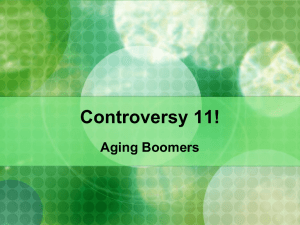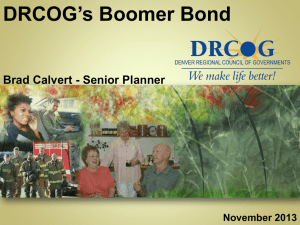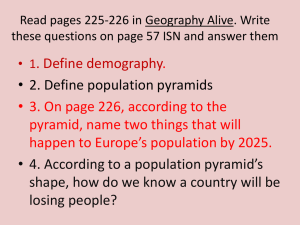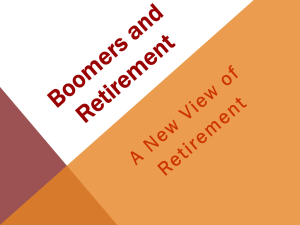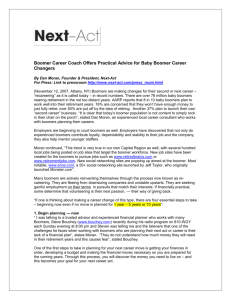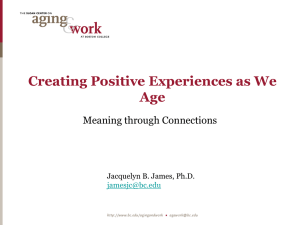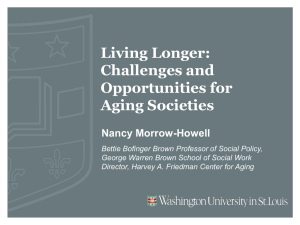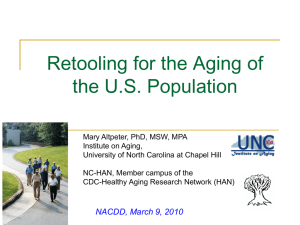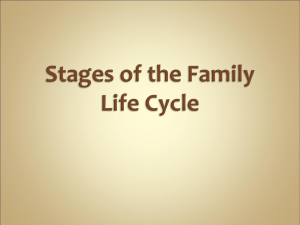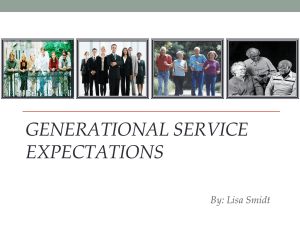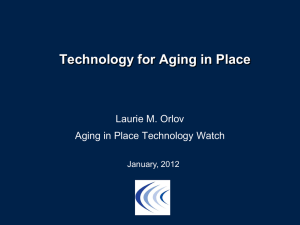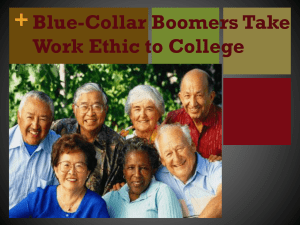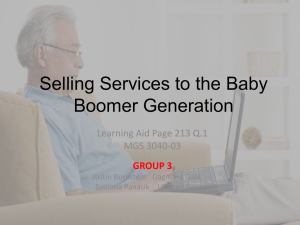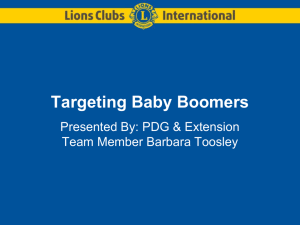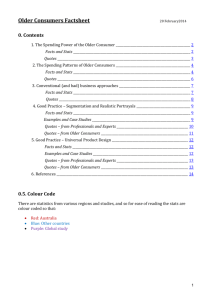Marketing to Aging Influencers
advertisement
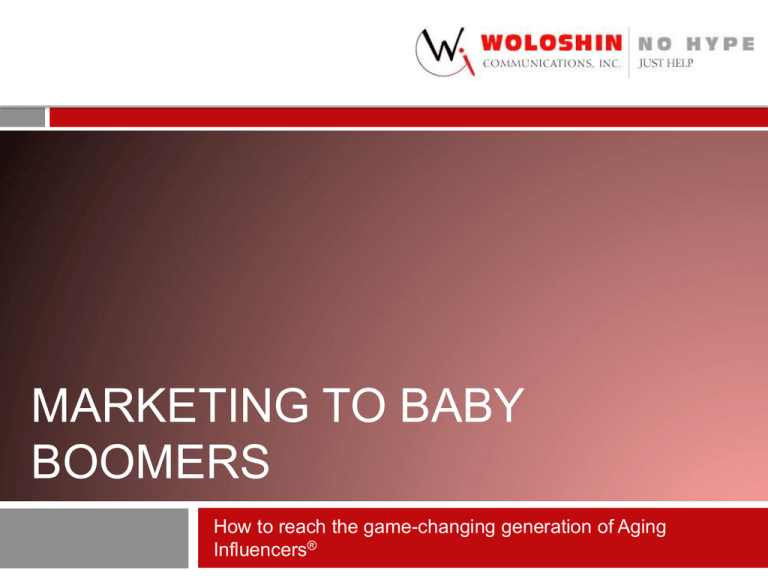
MARKETING TO BABY BOOMERS How to reach the game-changing generation of Aging Influencers® Learning Outcomes Learn the demographic and geographic characteristics of the Oregon Boomer Discover marketing tools (low or no-cost) at your fingertips Understand the best tools and tactics for your marketing and outreach campaigns Using data for your campaign Captures comprehensive and historical information Uses existing information (fast and free) You can use it RIGHT NOW Please try this at home (okay, your desk) Methodology used for 2012 report Secondary analysis of national data (115,000 MA participants) 2012 CMS data for Oregon 273,000 (65-69) 2010 Pacific Northwest 2012 lifestyle and trend analysis SRI values, attitudes & lifestyles 2012 survey 2012 Marketing to Aging Influencers Trends and milestones that define our target Pacific Northwest segmentation findings ® The Generations Traditionalists Baby Boomers Gen X-ers Millennials 1920 - 1944 1945 – 1964 1965 – 1980 1981 – 1991 65 – 89 years 45 – 64 years 29 – 44 years 18 – 28 years Source: Generational Learning produced for CMS June 2009 Generations & Gaps In Values Traditionalists 1920 - 1944 Baby Boom Generation 1945-1964 Gen X-ers 1965-1980 Millennials 1981 - 1991 Personal Allegiance Self-discovery Self-oriented Self-discovery Political Conservative Liberal Pseudo-conservative Semi-Liberal Social Law & order Altruistic, humanistic Competitive Humanistic Ethical Fundamental Moralistic Situational Moralistic Financial Save & pay later Buy now, pay later Buy now Buying Based on Have it now Almost hopeless The one with the most, wins Products necessity Clothes, entertainment, travel High-tech gadgets For work and fun “You owe me” “I want it, but may not be able to get it” Tools, homes, Reward cars, home appliances “I earned it” Source: adapted from Twenty something: Managing and Motivating Today’s New Workforce, Lawrence J. Bradford and Claire Have it now High-tech gadgets “We deserve it” 2012 Marketing to Aging Influencers Findings Geographic considerations Economic considerations Consumer data Marketing take-homes ® Boomer milestones (VALs) VALs = values, attitudes & lifestyles Born 1946 – 1964 The Kennedy years The Vietnam war The Summer of Love The “2.0” of grassroots organization The power of the group AND the individual This was the “bulk” of our population in 1981 Boomers & Val’s The leopard can’t really change spots Largest consumer force in the US Lifestyle defines consumer attitudes 1981 – refinancing mortgages 2012 – reverse mortgages The boomers in 1981(ages 30 – 34) Boomer growth in millions 65+ U.S. Census data sources Aging Influencers® Use of technology Want things “their way” Buy now, save? Active and knowledgeable consumers 12/2029 Dylan (Thomas) Boomers + 20X’s faster than Gen X Adoption of new services by generation Accenture study 2009. Accenture is a global management consulting, technology services and outsourcing company, with more than 249,000 people serving clients in more than 120 countries. Numbers reported represent percent changes in this generation and compared to adoption by Gen. X (29 – 44 years of age). Blog reading, increase for this generation between 2008 and 2009 67% Use of social network site, increase for this generation, 2008 – 2009 59% Playing video games on mobile devises, increase for boomers 52% Use of IPod or similar devise for listening to music Watching videos on on the internet 49% 36% For the third sector...(and others) Big-spending Boomers bend the rules of marketing…because - USA Today, 2010 Use of technology Want things “their” way Buy now, save$?? Active consumers (service me) Dylan (Thomas) DO NOT GO GENTLE INTO THAT GOOD NIGHT RAGE, RAGE AGAINST THE DYING OF THE LIGHT. 12/2029 Reality check Economic times Legislation Socio-economic considerations Legislative Milestones Medicare signed into law 1965 Cost of Living Adjustment (COLA) payments begin 1975 National Retirement Age (NRA) increased to 67 in 1983 First year of no COLA 2009 (will be paid in 2012) Socio-Economic Considerations Cuts in standard of living Working longer Role of state and other support is changing European debt issues Election year (information clutter media $$$) Unforeseen Economic Issues Adult Children at home national sources including US Census and Huffington Post (2010) Lower wages for all Lack of job opportunities Source: Huffington Post (2010), U.S. Census Geographic segmentation PNW Pacific Northwest Urban communities Suburban communities Rural Urban segment highlights Aging in place High school diploma, 24% bachelors or beyond Married, same home for 20+ If still working, they engage in professional, technical services, combined income >$75K Upscale hobbies esp. gourmet foods, gardening, decorating and travel Urban segment highlights Adult children (30%) living in their homes Like outdoors, travel, fitness, sports On-line shopper, use home delivery services and major credits cards Support social change, vote, volunteer and engage in charitable giving (i.e. the environment) Suburban segment highlights Aging in place High school diploma Married, same home for 20+ If still working, they engage in professional, technical services, combined income around $75K At-home hobbies esp. cooking, gardening, decorating, trend toward domestic vs. international travel Suburban segment highlights Live with adult children (as high as 35%) Like outdoors, travel, fitness, sports More traditional lifestyle, values Church involvement that includes charitable giving Heavy computer use, on-line shopper, also mail-order all with major credits cards Rural segment highlights Aging in place Some high school Married, same home for 20+ Higher percentage retired because of lifestyle illness or work injury Income less than $75K At-home hobbies esp. cooking, crafts, gardening, decorating Domestic travel if any at all (visiting relatives) Rural segment highlights Adult children (caretakers?) living in their homes Like outdoors, travel, fitness, traditional sports (fishing) Higher church and local social network involvement, very limited charitable giving More traditional lifestyle Computer use, on-line and mail-order shopper Prefers pay-as-you-go over credit cards New and old marketing tools Marketing tools go in and out of fashion Do-it yourself research Tools and tactics Campaign checklist Marketing trends Predictive modeling — let’s call it data analysis Eric Siegel, Ph.D., Data mining for competitive advantage What can you do with the lists you have Buying behavior, retention, forecasting How it works Compare, contrast, zip code zoning Make friends with the tax assessor Lifecycle Marketing Lifecycle marketing aka Nurture marketing 9x more value from their marketing efforts (email). Email marketing alone cannot power your lifecycle marketing. Attention Interest Desire Action Marketing tools to use Press releases Cross promotion Digital & print Events Grassroots outreach Calendar listings YouTube Social media Websites Email/DM Marketing Contact lists Customer service/involveme nt Your campaign checklist Strategy - the overriding approach to achieve the objectives REALISTIC objectives Tactics - how does each tool fit into the total program Staffing & resources - who and how much? Calendar - reviewing and measurement to delineate key milestones Recap Aging Influences and the Internet Customer service is king (or queen) Realistic goals Multiple tools and tactics Special thanks to… Diane M. Childs of the Oregon Department of Consumer & Business Services who inspired and help shape this report. Q&A Thank you!
